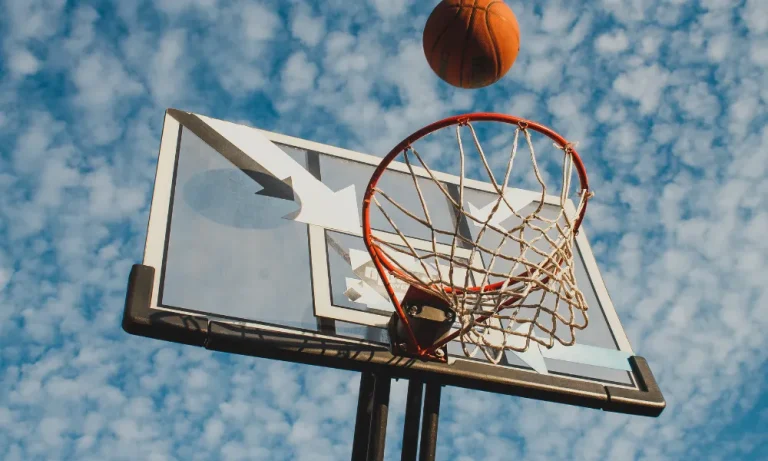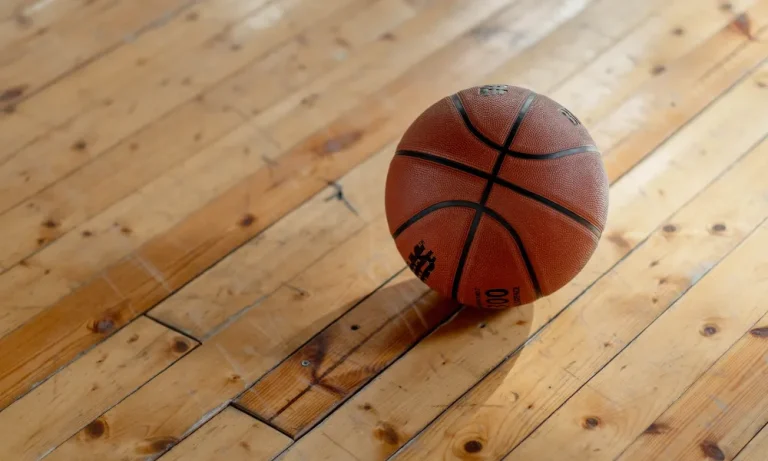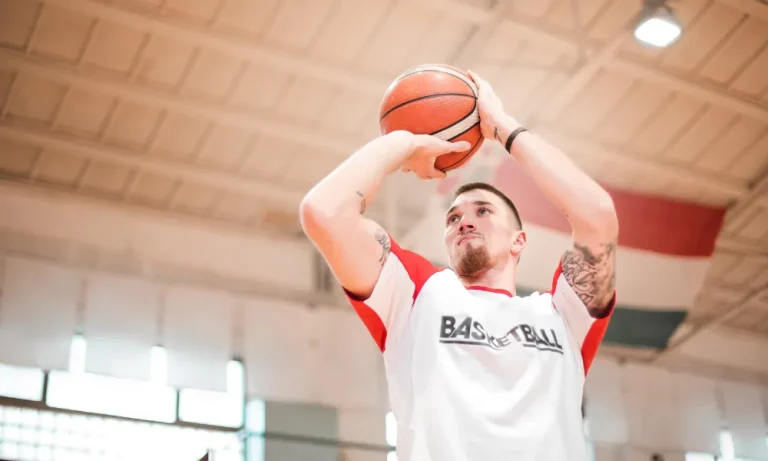Do NBA Players Wear Mouthguards?
Did you ever wonder if NBA players wear mouthguards while battling it out on the court? Well, it turns out that these athletes not only rely on their skills but also on this crucial piece of protective gear. In this article, I’ll explain why they’re essential for their safety and overall game. Get ready for an inside look at the mouthguard game in the NBA!
Why Mouthguards Are Important in Sports
When it comes to sports, protecting yourself is just as important as giving your best performance. That’s where mouthguards come into play. These small yet mighty devices serve a crucial purpose and offer several benefits that can make a significant difference in athletes’ safety and overall well-being.
1. Protection from Dental Injuries: The primary purpose of wearing a mouthguard is to safeguard your teeth and gums from potential damage during contact sports. Whether it’s an accidental elbow to the face or a collision with another player, the mouthguard acts as a cushion, absorbing the impact and reducing the risk of chipped teeth, broken jaws, or even tooth loss.
2. Prevention of Soft Tissue Injuries: Mouthguards not only protect your teeth but also provide a barrier between your lips, cheeks, and tongue, and the hard surfaces inside your mouth. This helps prevent lacerations, cuts, and bruises to the soft tissues, reducing the likelihood of painful injuries that may require stitches or medical attention.
3. Concussion Risk Reduction: While mouthguards primarily protect the mouth and teeth, studies suggest that they may also help reduce the risk of concussions. By absorbing some of the forces transmitted through the jaw, mouthguards can potentially lessen the impact on the brain, providing an added layer of protection against head injuries.
Not using mouthguards in contact sports can expose athletes to significant risks.
1. Dental Injuries: Without a mouthguard, athletes are susceptible to various dental injuries, including broken teeth, avulsed teeth (completely knocked out), or injuries to the soft tissues inside the mouth. These injuries can be painful, require extensive dental work, and even impact an athlete’s confidence and ability to perform.
2. Facial Fractures and Jaw Injuries: Contact sports involve physical collisions, and without a mouthguard, the risk of facial fractures and jaw injuries increases significantly. A blow to the face can result in fractures to the jawbone or other facial bones, leading to severe pain, difficulty eating, and potential long-term consequences.
3. Concussions and Brain Injuries: While mouthguards may not completely eliminate the risk of concussions, not wearing one can increase the chances of sustaining a head injury. Impact to the jaw can transmit forces to the brain, potentially causing concussions or more severe traumatic brain injuries.
NBA Players and Dental Injuries
When we think of NBA players, we often envision their incredible skills, high-flying dunks, and fierce competition. However, behind the scenes, these athletes face the risk of dental injuries that can have a significant impact on their careers and overall health. Let’s take a closer look at some statistics, examples, and the consequences of dental injuries suffered by NBA players.
The Impact of Dental Injuries on Players’ Careers and Health:
Dental injuries can have a significant impact on NBA players’ careers and overall well-being. Here are a few consequences they may face:
- Pain and Discomfort: Dental injuries can cause severe pain and discomfort, making it challenging for players to perform at their best. This can affect their shooting, passing, and overall game.
- Time Away from the Game: Depending on the severity of the dental injury, players may need time off to undergo dental procedures and recover. This absence from the court can disrupt their rhythm, chemistry with teammates, and overall performance.
- Psychological Effects: Dental injuries can have psychological effects on players, impacting their confidence and mental state. The fear of reinjury or changes in appearance may affect their on-court performance and overall well-being.
- Long-Term Consequences: Untreated dental injuries can lead to long-term consequences, such as tooth loss, misalignment, and jaw problems. These issues can persist even after players retire from the game, affecting their quality of life.
NBA Regulations on Mouthguard Usage
The NBA, known for its fast-paced and high-intensity games, places a strong emphasis on player safety. As part of their commitment to protecting players from potential dental injuries, the league has implemented specific regulations regarding mouthguard usage. Let’s delve into the NBA’s official stance on mouthguards and explore any rules or guidelines related to their usage.
The NBA’s Official Stance on Mouthguard Usage:
The NBA encourages players to wear mouthguards during games to minimize the risk of dental injuries. While the league does not mandate the use of mouthguards, it strongly recommends their usage to ensure players’ safety and well-being.
Specific Rules and Guidelines:
Though not mandatory, several NBA players choose to wear mouthguards voluntarily. However, there are no specific rules or guidelines regarding the design, type, or color of mouthguards in the league. Players have the freedom to select a mouthguard that suits their preferences and provides adequate protection.
It’s worth noting that while the NBA does not enforce mouthguard usage, individual teams may have their own policies regarding player safety equipment. Some teams may require their players to wear mouthguards during practice sessions or games to ensure consistency and minimize the risk of injuries.
Ultimately, the decision to wear a mouthguard rests with the players themselves. However, considering the physical nature of the game and the potential for dental injuries, it is highly recommended that NBA players take proactive measures to protect their teeth and gums by wearing a properly fitted mouthguard.
NBA Players Who Wear Mouthguards
In the fast-paced and physical world of the NBA, player safety is of paramount importance. Many NBA players have taken proactive measures to protect their teeth and gums by wearing mouthguards during games. Let’s take a closer look at some well-known NBA players who regularly sport mouthguards, their reasons for doing so, and their experiences.
1. LeBron James: LeBron James, one of the greatest basketball players of all time, is known for his meticulous preparation and attention to detail. He wears a mouthguard to protect against potential dental injuries, ensuring that his teeth remain in top shape throughout his career.
2. Stephen Curry: Known for his exceptional shooting skills and agility, Stephen Curry is another NBA player who consistently wears a mouthguard. Curry recognizes the physical nature of the game and understands the importance of protecting his teeth from accidental collisions on the court.
3. Russell Westbrook: Russell Westbrook, renowned for his explosive athleticism and aggressive style of play, opts to wear a mouthguard. Given the intensity with which he attacks the basket and competes for rebounds, Westbrook acknowledges the potential risk of dental injuries and takes preventive measures.
4. Kawhi Leonard: Kawhi Leonard, a two-time NBA Finals MVP, is known for his defensive prowess and strong work ethic. Leonard has been spotted wearing a mouthguard during games, prioritizing his oral health and minimizing the chances of dental injuries while on the court.
These players, among others, wear mouthguards not only to protect their teeth but also to maintain their overall health and performance. By safeguarding against potential dental injuries, they can focus on their game without worrying about the consequences of accidental collisions or impacts.
The Debate: Mouthguards vs. Performance
While mouthguards are recommended for player safety in the NBA, there is an ongoing debate regarding their potential drawbacks and impact on performance. Let’s explore the concerns related to wearing mouthguards and address the argument that they may affect performance or hinder communication on the court.
Drawbacks and Concerns:
Some players argue that wearing a mouthguard can be uncomfortable, causing difficulty in breathing or speaking during intense moments of the game. The bulkiness and tight fit of certain mouthguards can potentially obstruct airflow and limit communication between players.
Impact on Performance:
Opponents of mouthguards claim that wearing them can hinder performance, particularly in terms of agility and shooting accuracy. They argue that the presence of a mouthguard may alter the natural feel of the mouth and affect muscle coordination, potentially leading to a decline in performance.
Hindrance to Communication:
Another concern raised is that mouthguards may impede effective communication on the court. Clear and efficient communication among teammates is crucial for strategy execution and coordination. Some players believe that mouthguards can muffle speech and make it harder to convey instructions or call out plays during the game.
Tips for Choosing and Using Mouthguards
Selecting the right mouthguard for basketball and knowing how to use and maintain it properly are essential for optimal protection and comfort. Here are some practical tips to help you make the right choice and ensure your mouthguard remains effective:
Choosing the Right Mouthguard:
- Opt for a custom-fit mouthguard whenever possible. These are made specifically for your mouth, providing the best fit and comfort.
- If a custom-fit mouthguard is not feasible, consider a boil-and-bite mouthguard. These can be molded to fit your teeth by following the provided instructions.
- Look for a mouthguard that is made of durable materials and provides sufficient thickness to absorb impact effectively.
- Ensure the mouthguard covers both the upper and lower teeth for comprehensive protection.
Proper Maintenance and Cleaning:
- Rinse your mouthguard with cool water before and after each use to remove any debris or bacteria.
- Use a toothbrush and toothpaste or mild soap to gently clean the mouthguard. Avoid using hot water, as it can warp the shape.
- Store your mouthguard in a ventilated container to allow it to dry properly and prevent bacterial growth.
- Avoid exposing your mouthguard to excessive heat or direct sunlight, as it can cause distortion or damage.
Timely Replacement:
- Regularly inspect your mouthguard for signs of wear and tear, such as cracks, tears, or distortion.
- Replace your mouthguard if it becomes damaged or no longer fits properly.
- As a general guideline, consider replacing your mouthguard every season or every six months, depending on usage and wear.
FAQs – Do NBA Players Wear Mouthguards?
Do all NBA players wear mouthguards?
While it is not mandatory for NBA players to wear mouthguards, many choose to do so for added protection and peace of mind on the court.
What types of mouthguards do NBA players typically use?
NBA players often opt for custom-fit mouthguards made specifically for their mouths. These provide the best fit, comfort, and protection.
Are mouthguards only worn during games or also during practices?
NBA players usually wear mouthguards during both games and practices to ensure consistent protection during all basketball activities.
How often do NBA players replace their mouthguards?
The frequency of mouthguard replacement varies depending on usage and wear. Generally, NBA players replace their mouthguards every season or every six months.
Are mouthguards required by the NBA league for player safety?
The NBA does not have a specific requirement for players to wear mouthguards. However, the league prioritizes player safety and encourages the use of protective equipment, including mouthguards.
Conclusion
It is evident that many NBA players recognize the importance of wearing mouthguards. With the physicality and intensity of the game, protecting their teeth and oral health is a top priority. Mouthguards provide the necessary defense against dental injuries, instilling confidence and ensuring players can focus on their performance without worrying about their smile.



